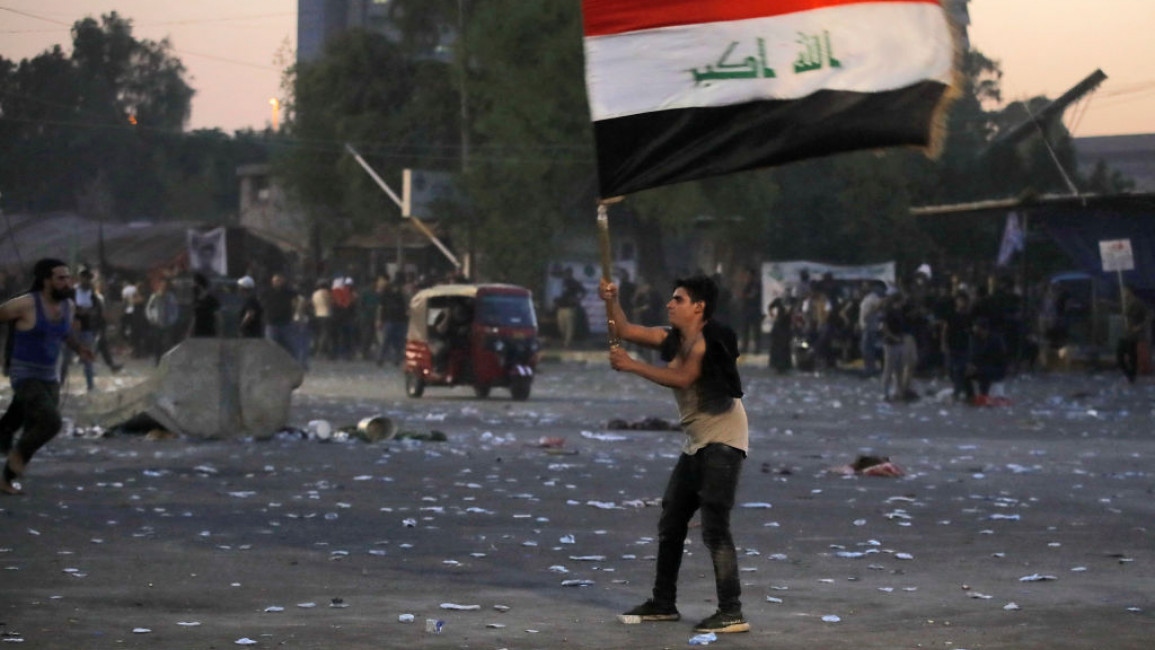Tense calm in Baghdad as new protests planned for 1 October
As the Iraqi political stalemate is approaching its first year, preparations are in the works to hold large demonstrations on 1 October in the Iraqi capital city of Baghdad to commemorate the third anniversary of the 2019 October protests, in which hundreds were killed and thousands were wounded.
Meanwhile, authorities have responded by heavily deploying security forces near Tahrir Square.
"October demonstrations are coming better than before, this time millions of Iraqis are expected to participate in peaceful demonstrations that would start from Tahrir Square by Saturday. There is no leader for this demonstration," Ali Abu Yazan, an Iraqi protestor now working as a taxi driver in Baghdad, told The New Arab.
"We have presented hundreds of martyrs, more than one thousand injured, and stayed for a long period in the streets, but the Iraqi ruling elites did not fulfil our demands since 2019," Abu Yazan added.
Demonstrators, mostly of the younger generations, had camped out in the capital's Tahrir Square and other public squares from October 2019 until early 2020, decrying endemic corruption, poor services and unemployment by the former Iraqi government led by Adil Abdul-Mahdi.
Over 600 people died as security forces and militias used live ammunition and tear gas to disperse crowds. Abdul-Mahdi was forced to resign and replaced by Mustafa al-Kadhimi, the current prime minister of the incumbent Iraqi caretaker government.
"I think even the expected demonstrations will not change anything from the existing reality in this country, as we saw many demonstrations by different political groups, but all failed to reach an outcome," Jumaa al-Quraishi, an Iraqi civilian running a small supermarket in Baghdad's Saadun Street, said to TNA.
"Unless the current system of with the ruling elites collapses and the Iraqi constitution changes, we will not see any positive outcome in this country, either through demonstrations or other violent means," he opined.
Iraq's political crisis is now entering its 12th month after the country conducted early elections on 10 October 2021, in which Muqtada al-Sadr's bloc won a majority with 73 seats. Sadr tried to form a 'national majority' government with several Sunni and Kurdish blocs, mobilising against pro-Iran Shia blocs organised under the Coordination Framework (CF).
Frustrated in his efforts to fulfil his promise to his supporters, however, Sadr ordered lawmakers from his bloc to resign, which all his MPs did on 12 June. The CF replaced Sadr's MPs with their own, becoming the biggest bloc in the Iraqi parliament. They vowed to form a consensus government that would include all the Sunni and Kurdish blocs.
An Iraqi car mechanic, speaking on condition of anonymity, told TNA that the situation in Baghdad is expected to deteriorate by Saturday since Sadr's supporters will also hold demonstrations from the city's Nusur Square. He also cautioned that the demonstrations are expected to lead to clashes with supporters of Nouri al-Maliki, the Iraqi former prime minister and arch-rival of Sadr.
Sadr, in a tweet on 29 August, unexpectedly announced his "final" retirement from politics, causing his supporters to take to the streets in Baghdad's fortified Green Zone and across central and southern Iraqi provinces.
His announcement turned the Green Zone - home to government buildings and embassies - into a battlefield between Sadr's Saraya al-Salam and Al-Mahdi Army militias against paramilitaries of the Iran-backed Al-Hashd Al-Shaabi network mostly loyal to al-Maliki.
More than 30 people were killed and hundreds were injured. The fighting ended the next day with a call from Sadr to his fighters to cease fighting and withdraw from the area.


![President Pezeshkian has denounced Israel's attacks on Lebanon [Getty]](/sites/default/files/styles/image_684x385/public/2173482924.jpeg?h=a5f2f23a&itok=q3evVtko)



 Follow the Middle East's top stories in English at The New Arab on Google News
Follow the Middle East's top stories in English at The New Arab on Google News


